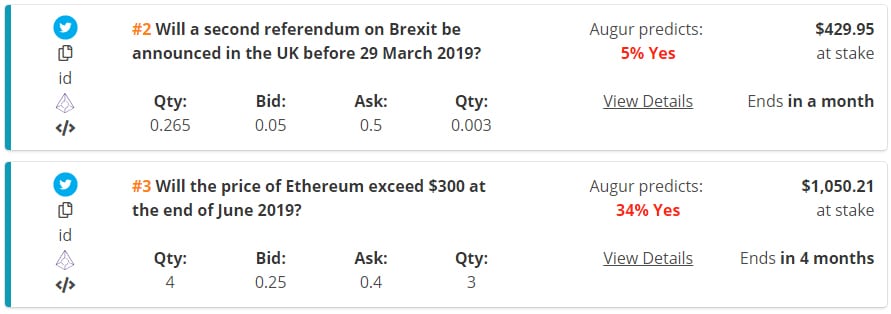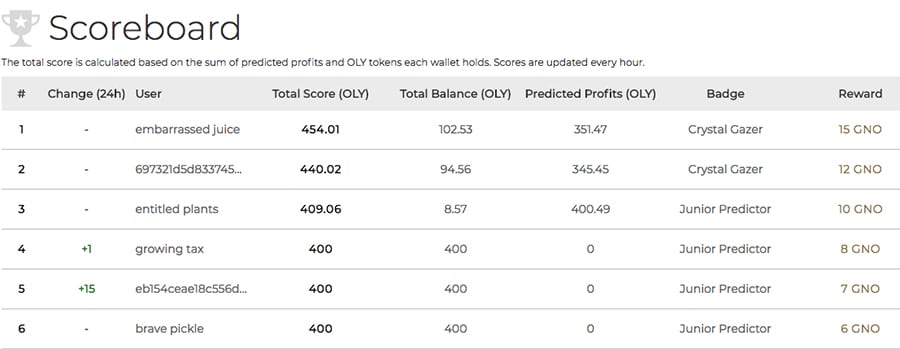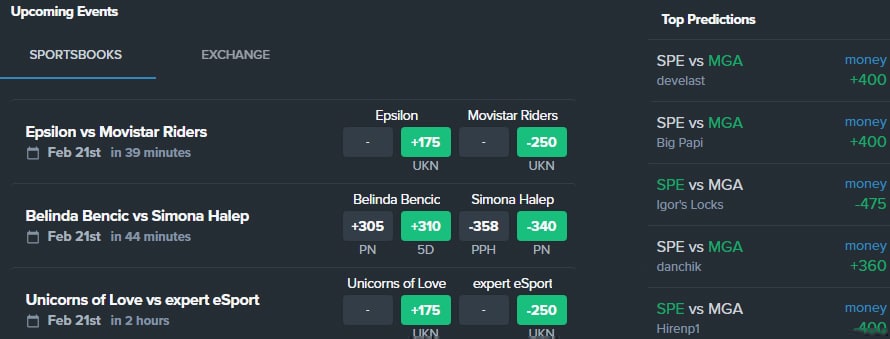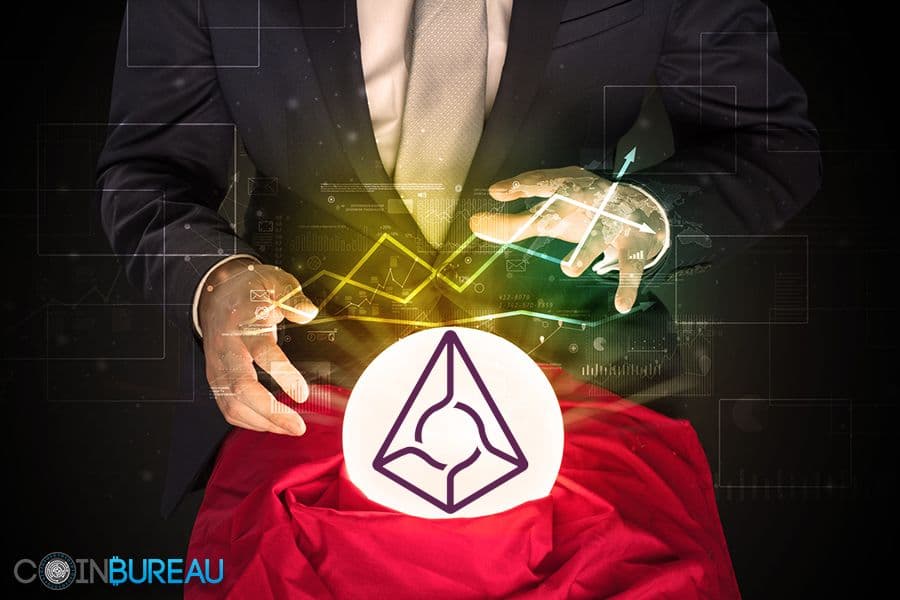Prediction markets have been around for some time, but putting them on the blockchain has made them far more reliable and accurate.
In fact, some researchers have found they are even more accurate than advanced statistical tools because of the reliance on knowledge and beliefs from a large number of users distributed evenly throughout the world.
The shift of prediction markets to the blockchain is one that was predictable itself. The decentralized blockchain fits predictive markets and tools perfectly. So perfectly that there are a number of projects exploring blockchain based predictive markets.
In this post I will take a look at 7 of the top crypto prediction markets and how they could potentially disrupt the betting industry.
1. Augur
Augur (REP) is one of the first decentralized, trustless blockchain prediction markets. It combines smart contracts and oracles to allow for the prediction of real-world events without any third-party involved. The Augur market model makes use of a four stage progression:
- Market Creation: – Anyone can create a prediction market based on a future real-world event. The creator sets the end time and also chooses smart researchers and oracles.
- Market Trading: – Once the market has been created participants are free to predict the outcome of the event using Ethereum (ETH) to make their prediction.
- Market Reporting: – Once the event is complete oracles work to determine the true outcome of the event so the settlement process can take place. This includes market reporters who provide the real world outcome. Those who gave accurate predictions are rewarded.
- Settlement: – Shares are distributed to traders who can settle with the market or with another trader in the same market. These shares are paid out in Augur REP tokens.
With Augur any future event can be used as a predictive model, including elections, weather events, company or stock forecasts, geopolitical events, the possibilities are endless.
 Some of the live events on Augur. Image via predictions.global
Some of the live events on Augur. Image via predictions.globalThe Augur mainnet only went live in the middle of 2018. Since the launch betting volume has grown considerably and is currently sitting at just over $2m in money at stake. There are also a range of bets that are currently on the go including events such as whether ETH will exceed $300 in June of 2019 or which club will win the UEFA champions league.
Augur was actually one of the very first projects to complete an ICO on the Ethereum blockchain. They raised just $5m back in October of 2015 at a price of $0.6 per REP token. This means that at current prices the token is considerably above their ICO price and has been a good investment for early backers.
REP tokens can be bought on exchanges such as Binance and given that they are ERC20 tokens they can be stored in a compatible wallet such as MyEtherWallet or MyCrypto.
2. Gnosis
Gnosis (GNO) is another of the older prediction markets, having been in development since 2015. The Gnosis team works under the premise that while information is readily available, not all information is true, and in most cases it also lacks objectivity and context. Information inherently is bias and can even be intentionally misleading. Gnosis plans on combating these tendencies in the following way:
- Gnosis will be an open platform available to all with unbiased and transparent access
- Gnosis will do away with the traditional method of using experts to make predictions and instead use an efficient marketplace that utilizes the knowledge of everyone.
- Individuals with information about an event are incentivized to participate and share their information.
- Questions and predictions can be made by anyone for any reason. Ultimately the platform could be like a decentralized customized version of Google that aggregate’s user knowledge from the global pool.
Gnosis has a number of uses, and with increased user participation it becomes more effective. Gnosis is built on the Ethereum blockchain and currently has an alpha version called Gnosis Olympia available where users can test the platform using play OLY tokens.
 Users testing Gnosis Olympia with OLY tokens. Image via Gnosis
Users testing Gnosis Olympia with OLY tokens. Image via GnosisGNO tokens are currently trading at a large discount to their ICO price so this could make them slightly more attractive from an investment perspective. If you would like to get your hands on some GNT then they can be bought on Kraken or Bittrex and they can be stored in any ERC20 compatible wallet.
3. Stox
Like Gnosis, Stox runs on the Ethereum blockchain. Created by a group of financial market veterans, Stox is a prediction market platform that allows trading in the results of any real-world event that can be imagined. Weather, politics, sports, celebrities and financial markets are just a few of the possibilities.
By using a decentralized, trustless platform Stox hopes to capture the attention of traders by providing them with a safe place to trade on real-world events without the intervention of governments or third party companies and firms. Much like Augur, it will allow its participants to profit from their knowledge in any field.
Stox was developed by a group of industry experts. It was founded by CEO and founder of Invest.com. It has also been backed by an advisory board of 9 members and has partnerships with the likes of Sirin labs, Blockchain capital and Cointree. Stox completed an ICO back in August of 2017 at a price of $1.86 per STX.
 Floyd Mayweather promoting the Stox ICO on his Instagram
Floyd Mayweather promoting the Stox ICO on his InstagramThis is also pretty well known as it was an ICO that was promoted by Floyd Mayweather. This endorsement led to a flood of interest in the Stox ICO. However, it proved to eventually be controversial in 2018 as the SEC closed in on paid promotions on social media.
Stox is trading at a considerable discount to the ICO price and was one of the biggest victims of the bear market. It is currently trading on exchanges such as HitBTC. Given that STX is an ERC20 token you can store it in any compatible wallet.
4. Delphy
Delphy is one of the newer blockchain prediction markets allowing its users to profit from their predictions regarding real-world events. Delphy caters to a global market, but is most focused on the Chinese market, and is one of the few prediction market services available there.
It also bills itself as a social platform that allows traders to come together and create their own markets. Delphy is built on the Ethereum blockchain and much like other prediction markets it allows users to profit from their predictions on a wide range of real-world events.
Delphy held an ICO back in 2017 and they were able to raise a total of $15m. Most of the trading volume on Delphy is currently taking place on CoinMex however there are also sizable markets on Gate.io and OkEX.
5. BlitzPredict
BlitzPredict is a blockchain prediction market, but unlike the others we’ve discussed BlitzPredict isn’t looking to cover every single real-time event. Instead it focuses on sports and gaming as well as politics. It’s unique in that it gives gamers a way to bet on the outcome of global matches of their favorite games. It also covers the massively popular area of sports betting. BlitzPredict is still in development and makes use of three tools:
- The BlitzPredict Aggregator – This ensures everyone using the platform has access to the best odds in any prediction market on the platform.
- BlitzPredict Liquidity Reserve – This tool ensures users receive their rewards immediately following the conclusion of an event, thus bypassing the delays experienced on other prediction markets
- BlitzPredict Smart Contracts – This tool gives users access to the prediction market and ensures maximum efficiency
One novel use for BlitzPredict will be for analytics. Currently each sportsbook uses its own analysis tools, and this leads to many different predictions for the same event. This leads to a fragmented outlook on the outcome of future events and creates inefficiencies in the markets.
 Upcoming events on Blitzpredict and the top markets. Image via BlitzPredict
Upcoming events on Blitzpredict and the top markets. Image via BlitzPredictBlitzPredict will do away with this inefficiency by incentivizing experts to share their information rather than keeping it proprietary. Outside users can gain access to the experts knowledge by spending XBP tokens. Experts will be rewarded for correct predictions, thus putting the best forecasters at the top while slowly ridding the platform of inferior predictors.
BlitzPredict completed an ICO in March of 2018 and they were able to raise a total $4.4m which was only 60% of their total target. Much like the other ICOs that raised in 2018, XBP tokens are at a considerable discount to their issue price. They are currently only available on the IDEX exchange and you can store them in any ERC20 compatible wallet.
6. Hivemind
Hivemind, or Bitcoin Hivemind as it is known to some, was born from Truthcoin and it is an open-source peer-to-peer prediction market based on the use of oracles. It is unique among the prediction markets on this list as it is designed as a sidechain of Bitcoin.
And rather than being focused on financial markets or sports betting, Hivemind is focused on governance issues. It believes governance problems can be easily addressed through a multi-factor decision making process which uses conditional prediction markets.
The highly ambitious project seeks to reduce issues in multi-factor decision making, and has already provided valuable insights into the capabilities of predictive markets in the realm of governance. In Hivemind the events must be resolved by voters and the decisions being voted on are either Boolean or scalar. Voters come to agreement on the decisions using the Hivemind VoteCoins. It’s not unlike the process used by Augur.
Also similar to Augur, voters are punished financially for inaccurate reporting, but rewarded for accurate results.
7. Bodhi
While Bodhi isn’t as well known as other prediction markets, it was actually the first to launch. That may be because Bodhi’s target market is China.
Bodhi is also unique because it is built on the Qtum platform, and it is the first functional decentralized application on Qtum. Bodhi has both a testnet and a mainnet and both are functional. The team is also now working on launching a version on the Ethereum blockchain.
Like other prediction markets, users can create markets on any real-world event. This is possible because of the decentralized nature of Bodhi. Chinese authorities, who are known to be authoritarian, haven’t yet said anything about this type of decentralized market, and even if they did the decentralized nature of the platform would keep it online.
Everything on the platform, from creating markets to staking against event outcomes to participating in the dispute process, is powered by the native BOT token. They completed an ICO in November of 2017 at a price of $0.37 which is slightly above the current price. The bulk of the trading on BOT is taking place on the LBank exchange and they can be stored in a QTUM compatible wallet.
Conclusion
Prediction markets are already proving their usefulness to the extent that companies such as Microsoft are taking advantage of the capabilities offered by blockchain based predictive markets. And some are calling them a better forecasting tool than any statistical model or computer based simulation.
It’s speculated they could be used to forecast stock market crashes and much more with great accuracy, and many in the blockchain community feel prediction markets are the future of predictions based on the wisdom of the crowd.
By relying on the wisdom of the crowd financial traders can do away with technical indicators, charts and trading signals. Human wisdom will tell them all they need to know about future market moves. Experts claim that by utilizing the knowledge and experience of a large sample group informed decisions and accurate forecasts can be made.
This seems to be borne out by the fact that some large organizations are already using these prediction markets for their own internal decision making and governance. There’s no telling how widely these markets will spread in the future.



